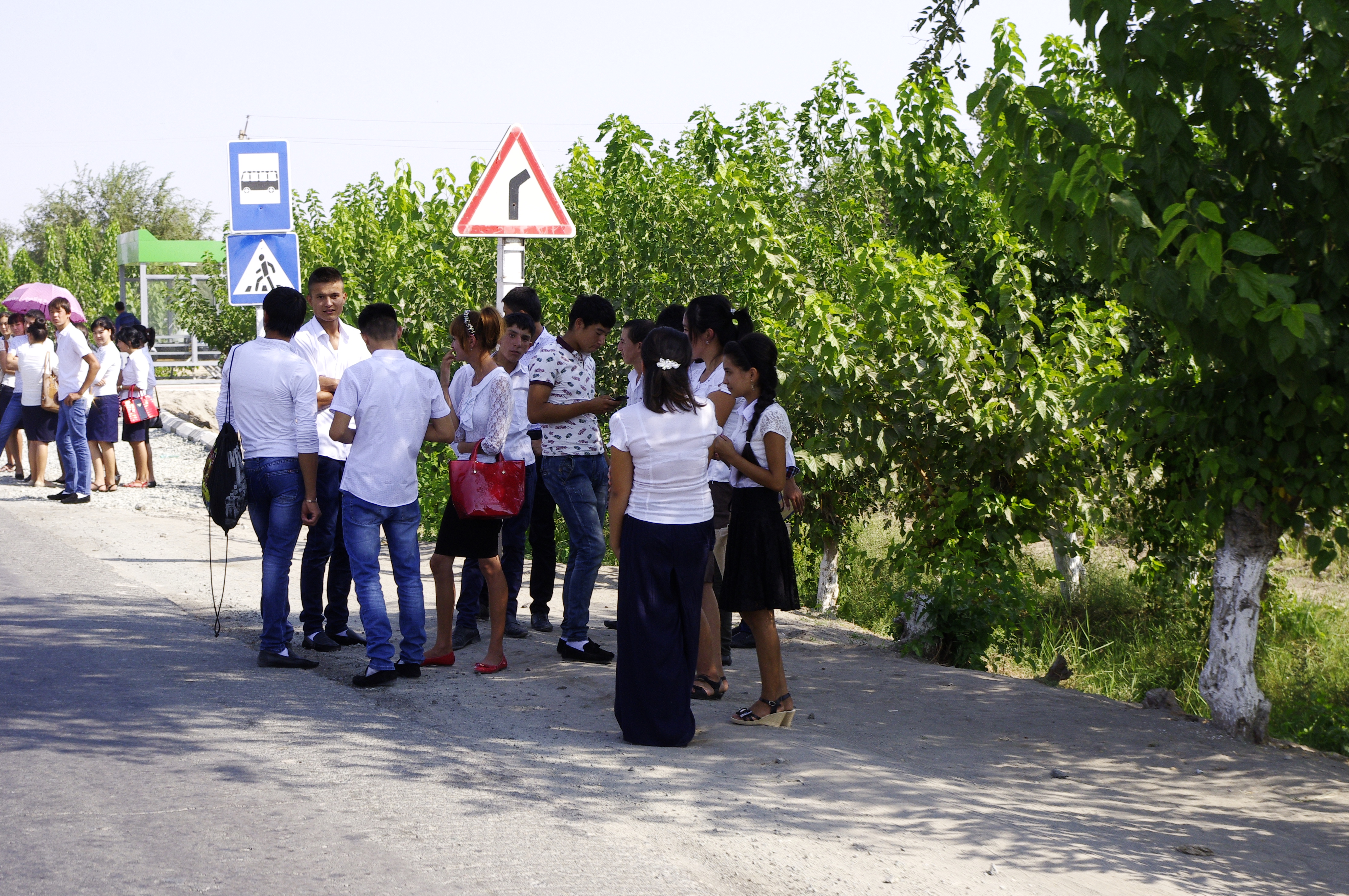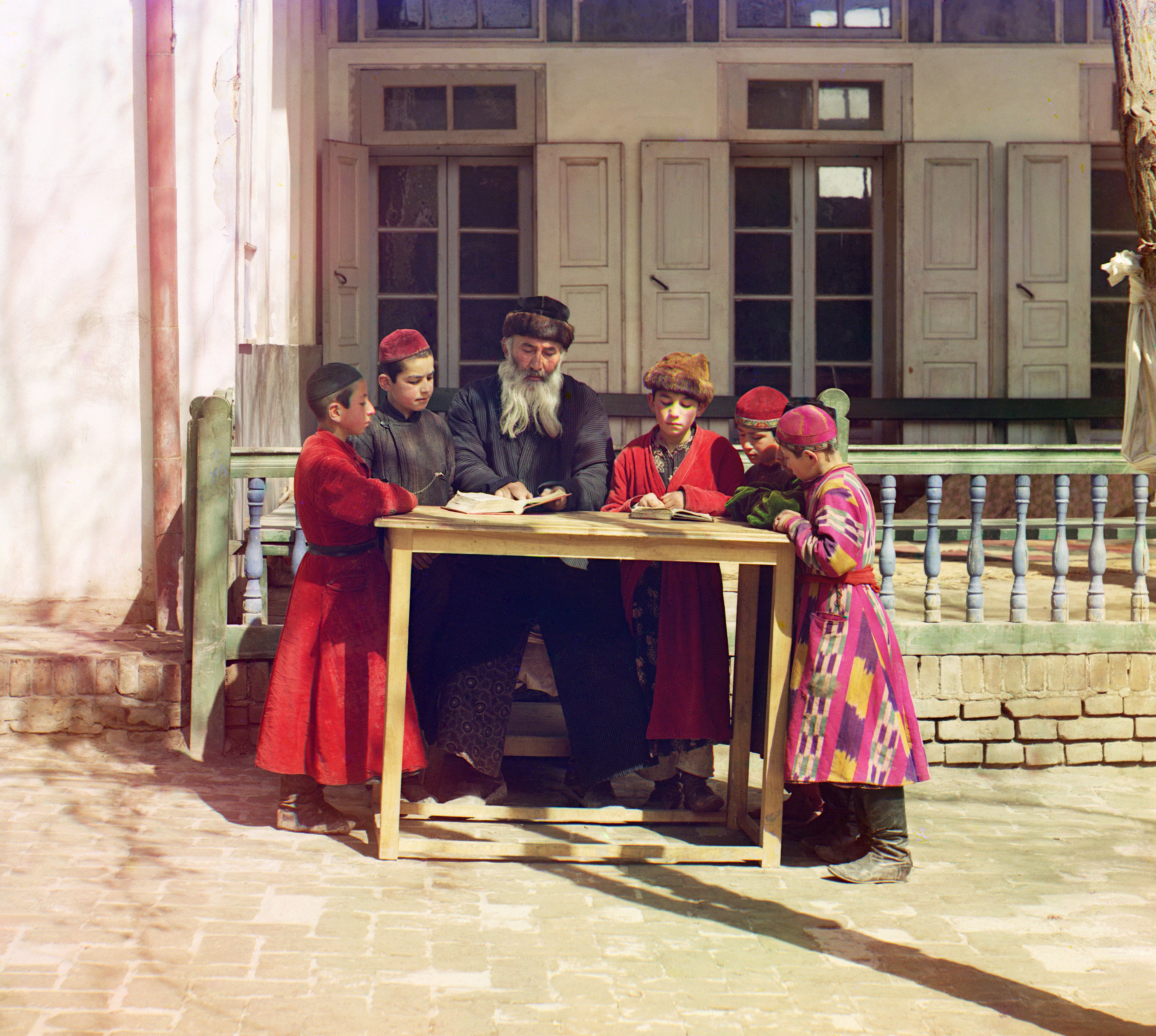|
Munawwar Qari Abdurrashidkhan Ogli
Munawwar Qari Abdurrashidkhan ogli ( Cyrillic Мунаввар Қори Абдурашидхон ўғли; Arabic name ) (*1878 in Tashkent; † 1931) was a leading Jadidist of late Tsarist Turkestan. Like other Jadids, Munnawwar Qari worked as author, poet, teacher, journalist and in other occupations. Life Munawwar Qari was the youngest child in a family of Islamic scholars and received his education in Tashkent and Bukhara. In 1901, he opened Tashkent's first Maktab to follow the Jadids new method of teaching. He also wrote textbooks for use in schools and published literary works of other authors, while publishing and editing ''The Sun'', one of the first independent newspapers in Russian Turkestan.Charles Kurzman: ''Modernist Islam, 1840–1940. A Sourcebook'', New York 2002, p. 33. After the Russian Revolution, he continued working as a teacher, but was arrested and deported to a Gulag camp in 1925Adeeb Khalid: '' The Politics of Muslim Cultural Reform: Jadidism in Ce ... [...More Info...] [...Related Items...] OR: [Wikipedia] [Google] [Baidu] |
Infobox Writer/doc
An infobox is a digital or physical table used to collect and present a subset of information about its subject, such as a document. It is a structured document containing a set of attribute–value pairs, and in Wikipedia represents a summary of information about the subject of an article. In this way, they are comparable to data tables in some aspects. When presented within the larger document it summarizes, an infobox is often presented in a sidebar format. An infobox may be implemented in another document by transcluding it into that document and specifying some or all of the attribute–value pairs associated with that infobox, known as parameterization. Wikipedia An infobox may be used to summarize the information of an article on Wikipedia. They are used on similar articles to ensure consistency of presentation by using a common format. Originally, infoboxes (and templates in general) were used for page layout purposes. An infobox may be transcluded into an article by ... [...More Info...] [...Related Items...] OR: [Wikipedia] [Google] [Baidu] |
Mahmudkhodja Behbudiy
Mahkmudkhodja Behbudiy (Cyrillic Маҳмудхўжа Беҳбудий; Arabic script ; born as Mahmudkhodja ibn Behbud Chodscha) (* 20 January 1875 in Samarkand; † 25 March 1919 in Qarshi) was a Jadid activist, writer, journalist and leading public figure in Imperial Russian and Soviet Turkestan. Life Mehmudkhodja Behbudiy was born on 20 January 1875 ( new calendar) on the outskirts of Samarkand in Russian Turkestan. Many members of his family were Islamic scholars, and Behbudiy too became a Qazi following his madrasah education. After an eight-month trip to Arabia, Transcaucasia, Istanbul and Cairo in 1899, which brought him into contact with the cultural movements in Islam in the wider world, he started his public career in Central Asia in 1903. He subscribed to Ismail Gaspirali's ''Tercüman'' and changed his name from ''ibn Behbud Chodscha'' to ''Behbudiy''. He also wrote articles in support of Jadidism in all Central Asian newspapers and in 1913 launched ''Ayina'' ("The Mi ... [...More Info...] [...Related Items...] OR: [Wikipedia] [Google] [Baidu] |
1931 Deaths
Events January * January 2 – South Dakota native Ernest Lawrence invents the cyclotron, used to accelerate particles to study nuclear physics. * January 4 – German pilot Elly Beinhorn begins her flight to Africa. * January 22 – Sir Isaac Isaacs is sworn in as the first Australian-born Governor-General of Australia. * January 25 – Mohandas Gandhi is again released from imprisonment in India. * January 27 – Pierre Laval forms a government in France. February * February 4 – Soviet leader Joseph Stalin gives a speech calling for rapid industrialization, arguing that only strong industrialized countries will win wars, while "weak" nations are "beaten". Stalin states: "We are fifty or a hundred years behind the advanced countries. We must make good this distance in ten years. Either we do it, or they will crush us." The first five-year plan in the Soviet Union is intensified, for the industrialization and collectivization of agriculture. * February 10 – O ... [...More Info...] [...Related Items...] OR: [Wikipedia] [Google] [Baidu] |
1878 Births
Events January–March * January 5 – Russo-Turkish War – Battle of Shipka Pass IV: Russian and Bulgarian forces defeat the Ottoman Empire. * January 9 – Umberto I becomes King of Italy. * January 17 – Battle of Philippopolis: Russian troops defeat the Turks. * January 23 – Benjamin Disraeli orders the British fleet to the Dardanelles. * January 24 – Russian revolutionary Vera Zasulich shoots at Fyodor Trepov, Governor of Saint Petersburg. * January 28 – ''The Yale News'' becomes the first daily college newspaper in the United States. * January 31 – Turkey agrees to an armistice at Adrianople. * February 2 – Greece declares war on the Ottoman Empire. * February 7 – Pope Pius IX dies, after a 31½ year reign (the longest definitely confirmed). * February 8 – The British fleet enters Turkish waters, and anchors off Istanbul; Russia threatens to occupy Istanbul, but does not carry out the threat. * Febru ... [...More Info...] [...Related Items...] OR: [Wikipedia] [Google] [Baidu] |
Soviet Writers
This is a list of authors who have written works of prose and poetry in the Russian language. For separate lists by literary field: * List of Russian-language novelists * List of Russian-language playwrights *List of Russian-language poets A * Alexander Ablesimov (1742–1783), opera librettist, poet, dramatist, satirist and journalist *Fyodor Abramov (1920–1983), novelist and short story writer, ''Two Winters and Three Summers'' *Grigory Adamov (1886–1945) science fiction writer, ''The Mystery of the Two Oceans'' *Georgy Adamovich (1892–1972), poet, critic, memoirist, translator *Anastasia Afanasieva (born 1982), physician, poet, writer & translator *Alexander Afanasyev (1826–1871), folklorist who recorded and published over 600 Russian folktales and fairytales, ''Russian Fairy Tales'' *Alexander Afanasyev-Chuzhbinsky (1816–1875), poet, writer, ethnographer and translator *Alexander Afinogenov (1904–1941), playwright, ''A Far Place'' * M. Ageyev (1898–1973), ps ... [...More Info...] [...Related Items...] OR: [Wikipedia] [Google] [Baidu] |
Uzbekistani Writers
The demographics of Uzbekistan are the demographic features of the population of Uzbekistan, including population growth, population density, ethnicity, education level, health, economic status, religious affiliations, and other aspects of the population. The nationality of any person from Uzbekistan is Uzbekistani, while the ethnic Uzbek majority call themselves Uzbeks. Much of the data is estimated because the last census was carried out in Soviet times in 1989. Demographic trends Uzbekistan is Central Asia's most populous country. Its 35 million people ( estimate) comprise nearly half the region's total population. The population of Uzbekistan is very young: 25.1% of its people are younger than 14. According to official sources, Uzbeks comprise a majority (84.4%) of the total population. Other ethnic groups, as of 1996 estimates, include Russians (5.5% of the population), Tajiks (5%), Kazakhs (3%), Karakalpaks (2.5%), and Tatars (1.5%).Uzbekistan iCIA World Factbook/ref> Uzb ... [...More Info...] [...Related Items...] OR: [Wikipedia] [Google] [Baidu] |
Soviet Publishers (people)
The Soviet Union,. officially the Union of Soviet Socialist Republics. (USSR),. was a transcontinental country that spanned much of Eurasia from 1922 to 1991. A flagship communist state, it was nominally a federal union of fifteen national republics; in practice, both its government and its economy were highly centralized until its final years. It was a one-party state governed by the Communist Party of the Soviet Union, with the city of Moscow serving as its capital as well as that of its largest and most populous republic: the Russian SFSR. Other major cities included Leningrad (Russian SFSR), Kiev ( Ukrainian SSR), Minsk (Byelorussian SSR), Tashkent ( Uzbek SSR), Alma-Ata ( Kazakh SSR), and Novosibirsk (Russian SFSR). It was the largest country in the world, covering over and spanning eleven time zones. The country's roots lay in the October Revolution of 1917, when the Bolsheviks, under the leadership of Vladimir Lenin, overthrew the Russian Provision ... [...More Info...] [...Related Items...] OR: [Wikipedia] [Google] [Baidu] |
Uzbekistani Publishers (people)
The demographics of Uzbekistan are the demographic features of the population of Uzbekistan, including population growth, population density, ethnicity, education level, health, economic status, religious affiliations, and other aspects of the population. The nationality of any person from Uzbekistan is Uzbekistani, while the ethnic Uzbek majority call themselves Uzbeks. Much of the data is estimated because the last census was carried out in Soviet times in 1989. Demographic trends Uzbekistan is Central Asia's most populous country. Its 35 million people ( estimate) comprise nearly half the region's total population. The population of Uzbekistan is very young: 25.1% of its people are younger than 14. According to official sources, Uzbeks comprise a majority (84.4%) of the total population. Other ethnic groups, as of 1996 estimates, include Russians (5.5% of the population), Tajiks (5%), Kazakhs (3%), Karakalpaks (2.5%), and Tatars (1.5%).Uzbekistan iCIA World Factbook ... [...More Info...] [...Related Items...] OR: [Wikipedia] [Google] [Baidu] |
Soviet Journalists
The Soviet Union,. officially the Union of Soviet Socialist Republics. (USSR),. was a transcontinental country that spanned much of Eurasia from 1922 to 1991. A flagship communist state, it was nominally a federal union of fifteen national republics; in practice, both its government and its economy were highly centralized until its final years. It was a one-party state governed by the Communist Party of the Soviet Union, with the city of Moscow serving as its capital as well as that of its largest and most populous republic: the Russian SFSR. Other major cities included Leningrad (Russian SFSR), Kiev (Ukrainian SSR), Minsk (Byelorussian SSR), Tashkent (Uzbek SSR), Alma-Ata (Kazakh SSR), and Novosibirsk (Russian SFSR). It was the largest country in the world, covering over and spanning eleven time zones. The country's roots lay in the October Revolution of 1917, when the Bolsheviks, under the leadership of Vladimir Lenin, overthrew the Russian Provisional Government tha ... [...More Info...] [...Related Items...] OR: [Wikipedia] [Google] [Baidu] |
Uzbekistani Journalists
The demographics of Uzbekistan are the demographic features of the population of Uzbekistan, including population growth, population density, ethnicity, education level, health, economic status, religious affiliations, and other aspects of the population. The nationality of any person from Uzbekistan is Uzbekistani, while the ethnic Uzbek majority call themselves Uzbeks. Much of the data is estimated because the last census was carried out in Soviet times in 1989. Demographic trends Uzbekistan is Central Asia's most populous country. Its 35 million people ( estimate) comprise nearly half the region's total population. The population of Uzbekistan is very young: 25.1% of its people are younger than 14. According to official sources, Uzbeks comprise a majority (84.4%) of the total population. Other ethnic groups, as of 1996 estimates, include Russians (5.5% of the population), Tajiks (5%), Kazakhs (3%), Karakalpaks (2.5%), and Tatars (1.5%).Uzbekistan iCIA World Factbook/ref> Uzb ... [...More Info...] [...Related Items...] OR: [Wikipedia] [Google] [Baidu] |
Uzbek Soviet Socialist Republic People
Uzbek may refer to: * Someone or something related to Uzbekistan * Uzbeks, an ethnic group * Uzbek language * Uzbek cuisine * Uzbek culture * Uzbeg (Ozbeg) Khan (1282–1341, r. 1313–1341), the khan of the Golden Horde of the Mongol Empire * Muzaffar al-Din Uzbek Muzaffar al-Din Uzbek, also known as Özbeg ibn Muhammad Pahlawan (died 1225) was the fifth and last ruler (''atabeg'') of the Eldiguzids from 1210 to 1225, during the later Seljuk and Khwarezmian periods. He was married to Malika Khatun, wido ... or Özbeg ibn Muhammad Pahlawan, last ruler of the Eldiguzids See also * * {{disambiguation Language and nationality disambiguation pages ... [...More Info...] [...Related Items...] OR: [Wikipedia] [Google] [Baidu] |
Jadids
The Jadids were Muslim modernist reformers within the Russian Empire in the late 19th and early 20th century. They normally referred to themselves by the Turkic terms ''Taraqqiparvarlar'' ('progressives'), ''Ziyalilar'' ('intellectuals') or simply ''Yäşlär/Yoshlar'' ('youth'). Jadid movement advocated for an Islamic social and cultural reformation through the revival of pristine Islamic teachings; while simultaneously engaging with modernity. Jadids maintained that Turks in the Russian Empire had entered a period of decay that could only be rectified by the acquisition of a new kind of knowledge and modernist, European-modeled cultural reform. Modern technologies of communication and transportation such as telegraph, printing press, postal system, railway as well as the spread religious literature through periodicals, journals, newspapers, etc. played a major role in dissemination of Jadid ideals. Although there were substantial ideological differences within the movement, Jad ... [...More Info...] [...Related Items...] OR: [Wikipedia] [Google] [Baidu] |





